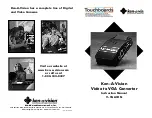
147
146
Model
Digital camera IS-1
Effective pixels
9.0 million pixels
CCD
1/1.6-inch Super CCD HR
Storage media
xD-Picture Card
(16/32/64/128/256/512 MB/1 GB/2 GB)
CF card and Microdrive™ (Compatibility is listed on Fujifilm website:
http://www.fujifilm.com/products/digital/)
File format
Still image: DCF-compliant
Compressed: Exif ver.2.2 JPEG, DPOF-compatible
Uncompressed: CCD-RAW (RAF)
✽
Design rule for Camera File System compliant DPOF
compatible
Movie: AVI format, Motion JPEG
Audio: WAVE format, Monaural sound
Number of recorded pixels
Still image: 3488
×
2616 pixels/3696
×
2464 pixels/2592
×
1944
pixels/2048
×
1536 pixels/1600
×
1200 pixels/640
×
480 pixels
(
⁄
/
„
/
÷
/
3
/
2
/
`
)
File size
See the table on P.150.
Lens
Fujinon 10.7
×
optical zoom lens
F2.8-F4.9
Focal length
f=6.2 mm-66.7 mm
(Equivalent to approx. 28 mm-300 mm on a 35 mm camera)
Digital zoom
Approx. 2
×
(10.7
×
optical zoom lens is used together:
Max. zoom scale: 21.4
×
)
Aperture (Wide-angle)
F2.8 to F11 Up to 13 steps in 1/3 EV increments Manual/Auto selectable
Focal range
Normal: Wide-angle: approx. 40 cm (1.3 ft.) to infinity (In High-speed
shooting mode: approx. 2 m (6.6 ft.) to infinity)
Telephoto: approx. 2 m (6.6 ft.) to infinity (In High-speed shooting
mode: approx. 4 m (13.1 ft.) to infinity)
Macro: Wide-angle: approx. 10 cm (3.9 in.) to 3 m (9.8 ft.)
Telephoto: approx. 90 cm (3.0 ft.) to 3 m (9.8 ft.)
Super macro: approx. 1 cm to 1 m (0.4 in. to 3.3 ft.) (Wide-angle only)
Sensitivity
AUTO/Equivalent to ISO 80/100/200/400/800/1600
Photometry
TTL 256-zones metering Multi, Spot, Average
Exposure control
Program AE (
B
,
√
,
À
,
U
,
,
,
/
,
N
), Shutter-priority AE, Aperture-
priority AE, Manual exposure
Scene position
√
(Picture Stabilization),
À
(Natural light),
U
(Portrait),
,
(Landscape),
/
(Night)
Exposure compensation
–2 EV to +2 EV in 1/3 EV-step increments (
N
,
M
,
<
)
Shutter speed
B
,
√
,
À
,
U
,
,
: 1/4 sec. to 1/4000 sec.
/
: 4 sec. to 1/500 sec.
N
/
M
/
<
: 4 sec. to 1/4000 sec.
>
: 30 sec. to 1/4000 sec.
Bulb (Up to 30 sec.)
Continuous shooting
Top 4-frame: Number of recorded frames: up to 4 frames
(Max. 1.5 frames/sec.)
Final 4-frame: Number of recorded frames:
last 4 frames before releasing the shutter button
(Max. 1.5 frames/sec.)
Long-period continuous shooting mode:
Number of recorded frames: up to 40 frames.
(Max. 1.1 frames/sec.)
Auto bracketing
± 1/3 EV, ± 2/3 EV, ± 1 EV
Focus
Mode: Auto focus, Continuous AF, Manual focus
AF system: TTL contrast-type
AF frame selection: AF (CENTER), AF (MULTI), AF (AREA)
Specifications
System
Troubleshooting
Possible causes
Solutions
The camera does not
emit any sound.
Frame erase does not
erase the frame.
The ERASE ALL function
does not erase all the
frames.
Screens are not
displayed in English.
There is no image or
sound on the TV.
The TV image is black
and white.
When connecting the
camera to a PC, the
photographed image or
playback image appears
on the camera’s screen.
Nothing happens when
using the Mode dial.
The camera no longer
works correctly.
Cannot print with
PictBridge.
The camera was
connected to a PC when
the USB mode was set to
“
®
”.
i
The camera volume is set too low.
i
The microphone was blocked during
shooting/recording.
i
There is something covering the speaker
during playback.
Some frames may be protected.
A language other than English is selected in
the “
ô
”
setting in the “
˜
” SET-
UP menu (
➡
P.100).
i
The included A/V cable was connected
during movie playback.
i
The camera is not connected to the TV
correctly.
i
“TV” is selected as the TV input.
i
The “
õ
” video output setting is incorrect.
i
The TV volume is turned down.
The “
õ
” video output setting is incorrect.
i
The USB cable (mini-B) is not correctly
connected to the PC or camera.
i
The PC is not turned on.
i
Camera malfunction.
i
The batteries have run out.
The camera has suffered an unforeseen
problem.
“
®
” PICTBRIDGE is not selected in “
ò
”
USB mode in the “
˜
” SET-UP menu.
i
Adjust the volume.
i
Take care not to block the microphone
during shooting/recording.
i
Make sure that the speaker is uncovered.
Unprotect frames using the camera on which
the protection was first applied.
1
Press the “MENU/OK” button to display the
menu.
2
Press “
a
” or “
b
” to select “
˜
” SET-UP and
press “
c
”.
3
Press “
a
” or “
b
” to select “
ô
” .
4
Press “
c
”.
5
Press “
a
” or “
b
” several times to select
“ENGLISH”.
6
Press the “MENU/OK” button.
i
After the movie playback mode is stopped,
connect the camera and TV correctly.
i
Connect the camera and TV correctly.
i
Set the TV input to “VIDEO”.
i
Change the setting to “NTSC” or “PAL”
(
➡
P.100).
i
Adjust the volume.
Change the setting to “NTSC” or “PAL”
(
➡
P.100).
i
Set up the camera, and connect the USB
cable (mini-B) correctly.
i
Turn the PC on.
i
Briefly remove the batteries or disconnect
the AC power adapter. Then reload the
batteries or reconnect the AC power adapter
and try again.
i
Load new or fully charged batteries.
Briefly remove the batteries or disconnect the
AC power adapter. Then reload the batteries
or reconnect the AC power adapter and try
again. If you think the camera is faulty,
contact your FUJIFILM dealer.
Select “
®
” PICTBRIDGE in “
ò
” USB
mode in the “
˜
” SET-UP menu.
Perform steps
1
to
3
to remove the camera
from the PC.
h
Windows
1
The “New Hardware Found” wizard or
“Scanner and Camera” wizard appears. If the
wizard does not appear, proceed to step
3
.
2
Click the [Cancel] button.
3
Disconnect the camera from the PC.
h
Macintosh
1
The window for locating the driver appears.
If the window does not appear, proceed to
step
3
.
2
Click the [Cancel] button.
3
Disconnect the camera from the
Macintosh.
Summary of Contents for Finepix IS-1
Page 77: ...153 152 Memo Memo ...
Page 80: ...159 158 Memo Memo ...
Page 82: ...163 162 Memo Memo ...










































